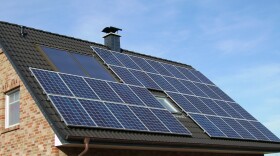Despite the pandemic, it’s been a good year for small-scale solar developers in the state.
“We've been super busy. This is the busiest year we've ever had,” says Ben Schimpf, a sales representative with Peninsula Solar, based in Marquette and Cedar.
Batteries are more efficient, the price of solar panels has plummeted, and solar customers are no longer restricted to the liberal crowd concerned about their carbon footprint.
“We can sell it to essentially both sides of the aisle,” says Ian Olmsted, president of Peninsula Solar.
For Olmsted, it’s obvious why there’s so much interest in the technology.
“Basically it comes down to price. I mean, you can be sending your kid to college for what you are paying electric rates in the U.P. for,” he says.
Yet despite all the potential for residential solar in Michigan, there’s a huge cloud hanging over the industry. Olmsted says state policy is crippling expansion — especially in the Upper Peninsula.
“Michigan should be a boom town — a boom state — for solar. And we’re not seeing it, we’re lagging behind,” says Olmsted. “We get a D minus for our policy.”
According to state law, there’s a cap on how people can install rooftop solar and hook up to the electric grid — meaning they can share excess electricity with their neighbors and buy energy at night.
In some areas, utilities have already reached their cap. Companies like Peninsula Solar have lost customers who want to install solar panels and remain connected to the electric grid.
“We have to turn them away because we know that the cap has been reached and the utility is not going to interconnect them,” says Schimpf.
And when you look around at other states, Michigan’s limit on rooftop solar is one of the most restrictive in the country.
“There's 40 other states with caps that are greater than 5 percent. We’re at 1 percent,” explains Schimpf. “Vermont, for example, is 15 percent. So, it’s really frustrating for us.”
A lot of solar installers like Schimpf and Olmsted are hoping lawmakers will step in to allow more rooftop solar projects.
Right now, there’s proposed legislation that would eliminate the cap on residential solar projects entirely.
It was introduced by Representative Greg Markkanen, a Republican from the western U.P., where electricity rates are some of the highest in the state.
It has support from both parties in the house, but some fear more rooftop solar would mean higher electricity prices for everyone else.
Utility companies in particular have raised this concern. A representative from DTE Energy told IPR News the company does not, “support our customers paying higher rates to subsidize those who invest in their own system.”
Charlotte Jameson, a policy expert with the Michigan Environmental Council, says there’s no evidence that residential rates in Michigan are going up because of rooftop solar.
“There are so many other states that have way, way higher levels of small-scale solar penetration, and they’re fine. Their grids are fine,” she says. “The sky isn’t falling. The utilities are able to maintain their grids.”
Down the road though, if a huge number of people put solar panels on their homes and businesses, and bought significantly less electricity from their utility, those companies would have to recover costs somehow, says Tony Anderson. He’s the general manager at Cherryland Electric Cooperative, a non-for-profit that serves a chunk of northwest Michigan.
“If you are going to have a bunch of solar on your house and only use my electricity when the sun goes down or when you have a problem with your system, there has to be a fee for that, and there has to be a fair fee,” he says. “And that’s easily done.”
Utilities could raise their monthly availability charge, with a higher fee for solar customers, according to Anderson.
Right now though, there’s nowhere near enough residential solar for this to be a problem.
And clean energy advocates say there’s already a policy in place to ensure solar customers pay their fair share. They actually sell the electricity they generate back to the grid for a fraction of the normal rate — through a complicated calculation called distributed generation, established several years ago.
Despite all this, Anderson says he’s not surprised big utility companies oppose the move to expand rooftop solar.
“They’re just trying to take care of their business,” he says. “They’re in the business of selling electricity, and this prevents that. So of course they would not like it.”
And a lot of these companies hold significant political sway in Michigan.
Utilities like DTE and Consumers have contributed millions of dollars to lobbying groups in the state and have spent tens of thousands of dollars on individual political campaigns to unseat industry critics.
Legislators like Representative John Roth, from Traverse City, say they have to work with utilities if they want to pass legislation.
In this case, he thinks there’s some middle ground.
“Uncapping in entirely may not happen. I’m pretty sure the electric companies are going to fight back on that,” he says.
More likely, lawmakers will negotiate to raise this cap, maybe to 5 percent or so, with a progressive increase, according to Roth.
Olmsted, from Peninsula Solar, thinks regardless of what happens with the legislation, the spread of rooftop solar is inevitable.
“It’s coming down the line. The technology, the battery prices are lowering every single day,” he says. “The policy is moving a lot slower than the technology.”
These days, a good part of his business is installing solar panels and battery systems so homes can be completely off the grid.
“People are going to be completely cutting the cord with their utility companies,” he says.
There’s nothing lawmakers, or utility companies, can do about that.





